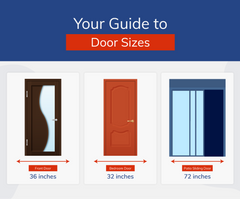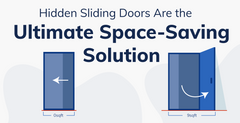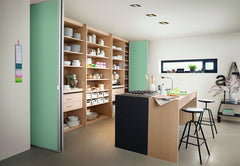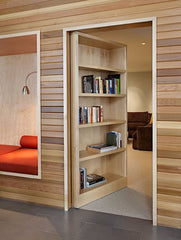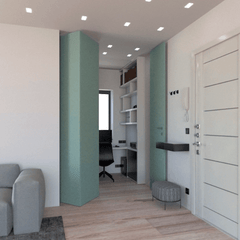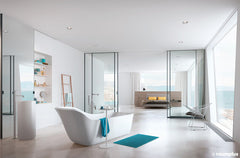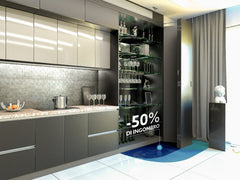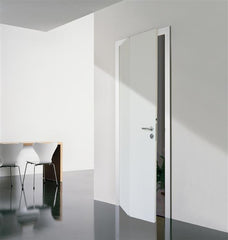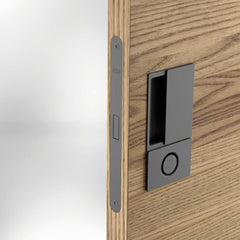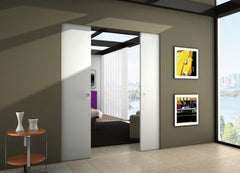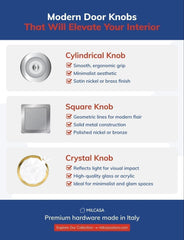
Different Types of Door Latches and Locks for Internal and Front Doors

Choosing the right door latches and locks for your home is crucial for security, functionality, and style. Different doors require different hardware solutions, and understanding your options helps you make informed decisions for your property. This comprehensive guide explores the most common types of door latches and locks available for both interior and exterior applications.
Understanding Door Hardware Basics
Door hardware serves multiple functions beyond basic security. The right door latches and locks provide privacy, safety, and smooth operation while complementing your home's design. Most door systems consist of three main components: the latch mechanism, the strike plate installed on the door frame, and the operating hardware like handles or knobs.
Related Article: A Comprehensive Guide To The Different Types Of Door Hardware
Modern door hardware comes in various materials including zinc, chrome, brass, and stainless steel. These finishes not only affect appearance but also durability and maintenance requirements. When selecting door latches and locks, consider factors like door thickness, frequency of use, security needs, and aesthetic preferences.
Related Article: A Complete Guide to Choosing the Right Handles for Your Doors
Essential Lock Types for External Doors
Front Door Latches and Locks
Front door latches and locks represent the first line of defense for your home. These systems typically combine multiple security features to provide maximum protection. The most common types include:
-
Deadbolt Locks: Deadbolts offer superior security for exterior applications. They use a solid metal bolt that extends deep into the door frame, making forced entry difficult. Single-cylinder deadbolts operate with a key from outside and thumb turn inside, while double-cylinder versions require keys on both sides.
-
Multi-Point Locking Systems: These sophisticated systems secure the door at multiple points along the frame. They're particularly popular for French doors and large entry doors where additional security points distribute stress and improve overall protection.
-
Cylinder Locks: Cylinder locks are widely used in exterior doors. These systems feature replaceable cylinders that can be rekeyed without changing the entire lock mechanism. They offer excellent security when combined with anti-snap, anti-pick, and anti-drill features.
Interior Door Lock Solutions
Mortise Locks for Interior Doors
Mortise locks are popular for interior applications due to their durability and clean appearance. These locks fit into a pocket (mortise) cut into the door edge, providing a flush installation. The installation process requires precision but results in a professional appearance.
Magnetic Mortise Locks
These innovative systems use magnets instead of traditional spring mechanisms. The nylon latch bolt is drawn into the strike by magnetic force, creating a completely silent operation. This makes them ideal for bedrooms, offices, and other quiet environments.
Benefits of magnetic systems include:
-
Silent closing with no mechanical noise
-
No protruding parts for improved safety
-
Smooth operation with minimal handle movement
-
Extended lifespan due to reduced wear
Pocket Door Latches and Locks
Pocket door latches and locks present unique challenges since the door slides into the wall cavity. These systems require specialized hardware designed for sliding door applications:
-
Flush Pulls: Most pocket doors use flush pulls that sit completely flat against the door surface. These may include locking mechanisms for privacy applications.
-
Edge Pulls: Some designs incorporate pulls along the door edge, allowing users to grip the door as it slides.
-
Mortise Pocket Door Locks: For applications requiring security, mortise locks designed specifically for pocket doors provide locking capability while maintaining the space-saving benefits.
Popular pocket door lock styles include rectangular, round, and square configurations. The choice often depends on door thickness and aesthetic preferences.
Related Article: What Is a Pocket Door? Understanding The Space-Saving Sliding Door Solution
Common Interior Lock Types
Lever Handle Systems
Lever handles are increasingly popular for interior doors due to their ease of use. They're particularly suitable for high-traffic areas and locations where accessibility is important.
Lever handle locks combine the operating handle with the locking mechanism. They're available in various backset measurements (typically 50mm or 60mm) to fit different door configurations.
Privacy Locks
Privacy locks are essential for bedrooms, bathrooms, and other areas requiring privacy without high security. These typically feature a simple turn-button mechanism on the interior side with emergency override capability from the exterior.
Related Article: How Do I Open a Locked Bedroom Door? Solutions for Every Situation
Latch Mechanisms and Operation
Spring Latches vs. Magnetic Systems
Traditional spring latches use mechanical springs to hold the latch bolt in position. While reliable, they can create noise during operation and may wear over time.
Magnetic latches offer several advantages:
-
Completely silent operation
-
No spring fatigue over time
-
Smooth engagement without impact
-
Self-aligning properties reduce installation tolerances
Material and Finish Options
Hardware Materials
Quality door hardware uses durable materials that resist wear and corrosion:
-
Brass: Offers excellent corrosion resistance and can be polished or brushed for different appearances.
-
Stainless Steel: Provides maximum durability and modern appearance, ideal for high-use applications.
-
Zinc Alloy: Cost-effective option that accepts various finishes while maintaining adequate strength.
-
Chrome Finishes: Available in polished or satin varieties, chrome provides durability and easy maintenance.
Finish Considerations
Different finishes suit various design styles and maintenance preferences. Polished finishes show fingerprints more readily but offer classic elegance. Satin and brushed finishes hide minor scratches and fingerprints better, making them practical for high-use areas.
Specialized Applications
Sliding Door Hardware
Beyond pocket doors, sliding systems include barn doors and room dividers. These applications often use different hardware approaches:
-
Surface-mounted track systems
-
Concealed sliding mechanisms
-
Magnetic closing systems for doors without traditional locks

Magic 2 - Wall Mount Concealed Sliding System for Wood Doors
Heavy Door Considerations
Heavier doors require more robust hardware with stronger latching mechanisms. Some systems are specifically rated for door weights, ensuring reliable operation over time.
Installation and Maintenance
Professional vs. DIY Installation
While basic lock replacement is within reach of most homeowners, complex installations benefit from professional expertise. Mortise lock installation requires precise cutting and fitting that can damage doors if done incorrectly.
Ongoing Maintenance
Quality door hardware requires minimal maintenance, but periodic lubrication keeps mechanisms operating smoothly. Magnetic systems need even less maintenance due to their contact-free operation.
Regular inspection helps identify wear or alignment issues before they become problems. Most quality locks offer long service lives when properly maintained.
Making the Right Choice
Selecting appropriate door latches and locks involves balancing security needs, aesthetic preferences, and budget considerations. External doors prioritize security features, while interior applications focus on convenience and style.
Consider the full range of requirements for each application:-
Security level needed
-
Frequency of use
-
Aesthetic compatibility
-
Installation complexity
-
Long-term maintenance needs
Quality hardware represents a worthwhile investment that enhances both security and home value. Whether you choose traditional mechanical systems or innovative magnetic solutions, proper selection and installation ensure years of reliable service.Ready to upgrade your door hardware? Explore Milcasa's premium collection of Italian door latches and locks featuring innovative magnetic systems, traditional mortise locks, and specialized pocket door solutions. With competitive prices, expert craftsmanship, and a variety of finishes to suit any home, Milcasa offers the perfect blend of security, style, and functionality. Visit our store today to discover why discerning homeowners trust Milcasa for their door hardware needs.
FAQ
What's the difference between door latches and door locks?
Door latches hold doors closed but don't provide security, while door locks include mechanisms that prevent unauthorized opening. Many systems combine both functions in a single unit.
Can I install pocket door latches and locks myself?
Basic pocket door hardware installation is possible for experienced DIYers, but precise measurements and cutting are required. Professional installation ensures proper fit and operation.
How do I choose the right backset for my door?
Measure from the door edge to the center of the existing holes. Standard backsets are 50mm or 60mm, but always verify before ordering new hardware.
Are magnetic locks as secure as traditional locks?
Magnetic locks provide equivalent security to traditional mortise locks while offering superior quiet operation. They're ideal for interior applications where noise is a concern.
What maintenance do door latches and locks require?
Most quality hardware needs only periodic lubrication and cleaning. Magnetic systems require even less maintenance due to their contactless operation.

